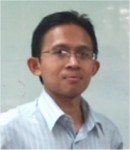|
Plenary
Lecture
Why Telehealth has not been Widely Implemented yet?

Professor Eko Supriyanto
Head of Department for Clinical Science and
Engineering
Faculty of Health Science and Biomedical Engineering
Universiti Teknologi Malaysia (UTM)
Johor Bahru, Malaysia
E-mail:
eko@biomedical.utm.my
Abstract: Evolution from wired to wireless
communication systems has brought great advantages to
many sectors including telehealth services. Telehealth
allows health care professionals to diagnose and treat
patients in remote locations using telecommunication
technology. In few developed countries, telehealth has
become standard medical practice. Over 10,000 peer
review papers have been published during past 20 years
supporting the clinical effectiveness and cost savings
of telehealth. Unfortunately, telehealth has not been
implemented widely yet. In order to identify the
resistance and enabling factors for the implementation
of telehealth especially in developing countries, a
comprehensive study has been done and will be presented
in this conference. This includes communication and
application technologies, standard and legal issues,
cost and business models, as well as user and key player
requirements. The study result shows that technology has
become an important enabling factor. Some technologies
even have fulfilled the critical requirements such as
reliability, user friendliness, simplicity, safety,
security, cost effectiveness, connectivity and
compatibility. However, without solving of related legal
issues, implementation of excellence business model as
well as user acceptance, telehealth will be difficult to
be implemented widely. Some telehealth models also will
be presented in this conference. It is hoped that the
developed model can be widely implemented in the near
future. This will benefit to people in rural areas,
developing countries, correction facilities (prison and
rehabilitation centre), schools, mobile units, disaster
areas, and industrial units (mines).
Brief Biography of the Speaker:
Assoc. Prof. Dr.-Ing. Eko Supriyanto is the head of
Department for Clinical Science and Engineering,
Universiti Teknologi Malaysia. He obtained his PhD in
electronics engineering from University of Federal Armed
Forces Germany, Hamburg. He worked as an academic staff
at this university and a product development manager in
private company in Duesseldorf, Germany, before moved to
Malaysia. He was also a visiting professor at Ilmenau
University of Technology, Germany. His involvement in
the computer network and internet has been started with
the development of Radio Packet Network Operating System
(RPNOS) in 1994. He has 12 patents with some of them are
for telemedicine products. He also obtained more than 20
international awards including awards for telemedicine
system and interface. He has more than 100 publications
in international journals and book chapters and one of
authors in the Book of “Advances in Telemedicine:
Technologies, Enabling Factors and Scenarios” edited by
University of Medicine, Berlin, published by INTECH in
March 2011. He was also active in WSEAS conferences
since 2009 as speaker for 27 papers and session
chairman.
|
